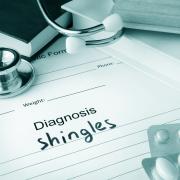If you had chickenpox as a child, you may be at risk of developing shingles as an adult, as both conditions are produced by the same virus: varicella-zoster. Even after the condition has improved and symptoms have disappeared, people never truly recover from the disease. The virus lies dormant in the body and has the potential to resurface later in life. Research suggests that the virus comes back as an individual gets older and their immune system becomes weaker. The pain management specialists at Southwest Spine and Pain Center are able to help patients understand what shingles pain is and how to prevent it from becoming chronic.
Understanding Shingles Pain
Shingles typically begins with pain and other symptoms such as sensitivity to touch, numbness,  or tingling. After a few days, the condition progresses into a painful, blistering rash. Shingles patients may also experience fevers, headaches, and body aches. Depending on the location of the pain, patients may mistake their symptoms with heart, lung, or kidney problems. Nevertheless, some people with shingles never develop a rash, or really intense, sharp pains. Some shingles patients have reported pain flare-ups from certain triggers like brushing skin across furniture or from the wind hitting their bodies.
or tingling. After a few days, the condition progresses into a painful, blistering rash. Shingles patients may also experience fevers, headaches, and body aches. Depending on the location of the pain, patients may mistake their symptoms with heart, lung, or kidney problems. Nevertheless, some people with shingles never develop a rash, or really intense, sharp pains. Some shingles patients have reported pain flare-ups from certain triggers like brushing skin across furniture or from the wind hitting their bodies.
Prevention
A shingles vaccine has been available since 2006, and most physicians will recommend patients over the age of 60 get vaccinated. According to Science Based Medicine, the shingles vaccine has been proven to prevent shingles 51% of the time. If a patient already has shingles, it is recommended he or she covers up the rash to keep it from spreading throughout their body.
Avoiding Chronic Pain
If left untreated, shingles pain has the potential to become chronic and may be more difficult to treat. At Southwest Spine and Pain Center, our physicians understand how shingles pain affects a patient’s day-to-day life and can prescribe pain medications that may prevent further nerve damage while managing the patient’s pain. If medication is not enough, Southwest Spine and Pain Center physicians may suggest corticosteroid injections to help target and tackle pain. It is important patients seek pain treatment early to reduce their risk of developing chronic shingles pain. To learn more about treatment for shingles pain, please visit our diagnoses and treatments page.
If chronic pain is impacting your life, don't wait to schedule an appointment at Southwest Spine and Pain Center. With multiple locations across the state of Utah, the pain management specialists at Southwest Spine and Pain Center are dedicated to helping those who suffer from chronic pain live the life they want to! To schedule an appointment, visit our locations tab!
The advice and information contained in this article is for educational purposes only, and is not intended to replace or counter a physician’s advice or judgment. Please always consult your physician before taking any advice learned here or in any other educational medical material.
